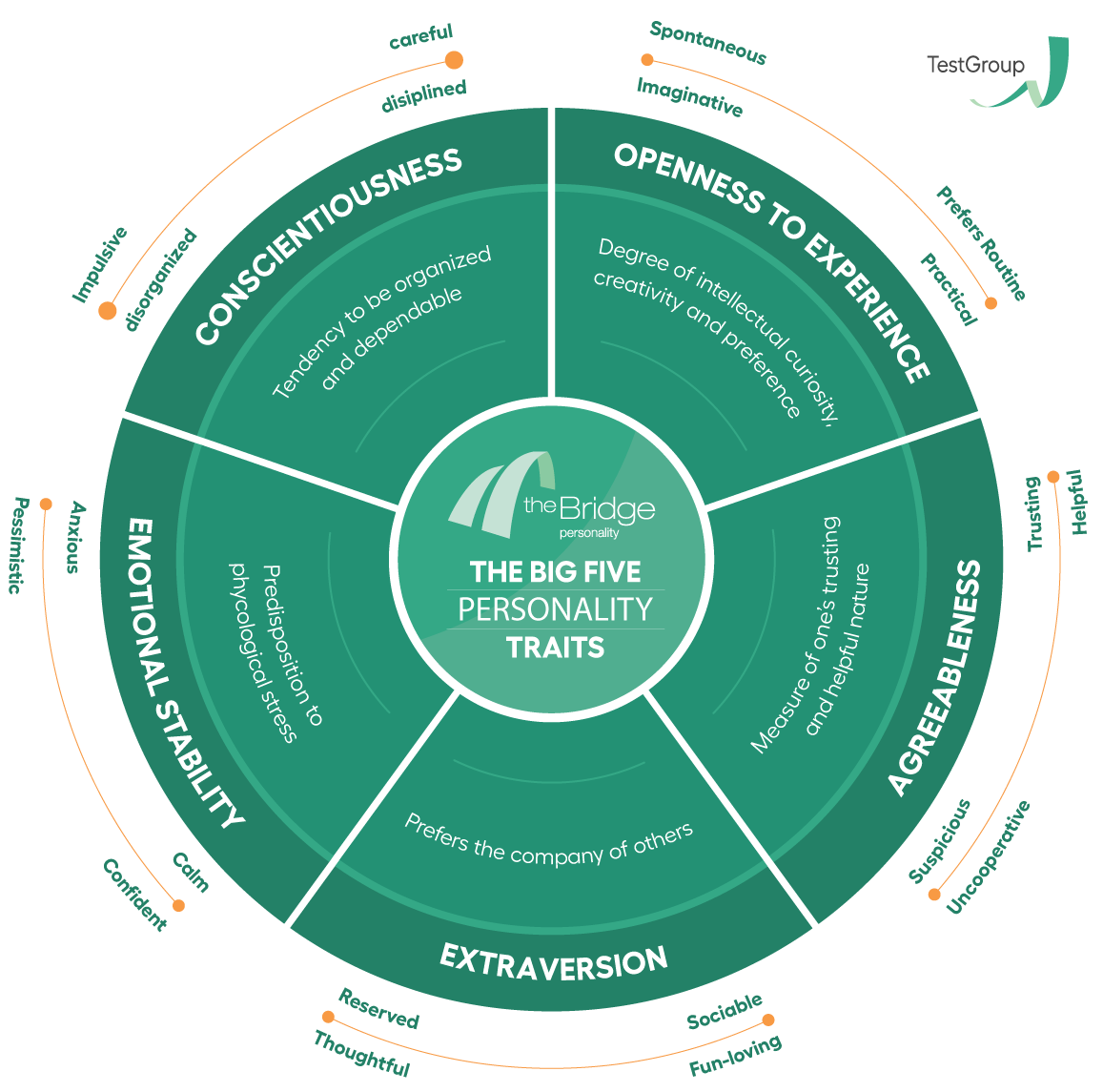Big Five Personality Test: Extraversion
For 15 years, The Bridge Personality has been the favorite Big Five personality test among many companies and organizations worldwide. This leading test utilizes the famous Big Five theory to analyze personalities. Experts consider it the best method for assessing individuals during the recruitment of new staff. The Big Five theory posits that our character is composed of five key traits. These significant characteristics lay the foundation for the so-called Big Five, the five factors that shape our personality.
You can order this Big Five personality test for each candidate or get an online assessment account to manage it yourself, which is more cost-effective.
The Big Five personality test, which is based on science, identifies five main aspects of personality: Openness to Experience, Conscientiousness, Extraversion, Agreeableness, and Emotional Stability. Collectively, these aspects are known as the Big Five. The model, also known as the OCEAN model, is widely used in the recruitment and selection process due to its solid scientific foundation.

What is the Big Five personality trait: Extraversion?
Extraversion, a Big Five personality test trait, is identified by qualities like excitability, sociability, talkativeness, assertiveness, and emotional expressiveness. Extroverts are energized by social interactions, finding excitement and energy in being around others. In contrast, introverts, who score low on this trait, are more reserved and find social settings energy-draining, often needing solitude to recharge.
Extraversion encompasses warmth and enthusiasm in social situations, as well as a tendency towards assertiveness and seeking new experiences. Extroverts are often seen as the life of the party, engaging more in conversation and leading group activities. Research links extraversion to positive life outcomes, suggesting extroverts tend to be happier, more successful, and more likely to be leaders compared to introverts. However, this doesn't imply that being extroverted is inherently "better." Both introversion and extraversion have their advantages and disadvantages. Recent studies suggest that ambiverts, who fall in the middle of the introversion-extroversion spectrum, may enjoy benefits from both extremes, potentially leading to better overall outcomes.
The science of Extraversion
Extraversion, characterized by traits like talkativeness, energy, assertiveness, and being outgoing, places a strong emphasis on social interaction, often leading extraverts to take on leadership roles and be the first to voice opinions and suggestions.
The science behind the Big Five personality trait of Extraversion is rooted in decades of psychological research and theory. Extraversion, characterized by sociability, assertiveness, and high energy levels, has been extensively studied and validated across various cultures and methodologies. Pioneering work by Costa and McCrae in the 1980s, particularly their development of the NEO Personality Inventory, provided a robust framework for measuring Extraversion alongside the other Big Five traits (Costa & McCrae, 1992). This research aligns with Eysenck's earlier biosocial theory of personality, which proposed biological underpinnings for extraverted behaviors, suggesting that extraverts have a lower baseline of arousal and thus seek external stimulation (Eysenck, 1967). Furthermore, studies utilizing the Big Five have consistently linked Extraversion to positive life outcomes, such as happiness and career success (Digman, 1990; John, Naumann, & Soto, 2008). Recent advancements in neuroimaging and genetics have begun to explore the neurological and genetic correlates of Extraversion, offering a more nuanced understanding of its biological basis (DeYoung, 2010; Canli, 2008). This body of work collectively underscores Extraversion's significance as a stable, heritable, and culturally universal dimension of human personality.
The role of extraversion in the workplace has sparked considerable debate in Western business circles. Popular literature often highlights the work-related benefits of being extraverted. For instance, Susan Cain in her bestselling book "Quiet" (2013) criticizes the societal overemphasis on extraversion in the U.S., suggesting that introversion is unfairly deemed inferior. Bloomberg Businessweek advised readers to "release your inner extravert" since introverts can find it challenging to progress in large organizations (Welch, 2008). Additionally, the Society for Human Resource Management recommended strategies for managers to support introverted employees, like allowing breaks from intense office environments (RoAne, 2017). This suggests a view of introversion as a hindrance needing accommodation. Contrarily, other sources argue that introversion offers competitive advantages, such as better listening skills and focus, while also pointing out the drawbacks of extraversion, like difficulty working alone (Hall, 2016; Laney, 2002; Cain, 2013). Forbes even highlighted successful introverts, illustrating that introversion can also lead to career success (Morgan, 2015).
Which Big Five personality test facets measure Extraversion?
The Big Five personality test measures 34 personality facets that are linked to the Big Five personality traits. The facets that measure Extraversion are:
The Bridge Tests & Online Assessments
TestGroup is the official provider of the renowned Bridge tests and online assessments, which are high-quality, scientifically validated psychometric tools used globally. Developed in collaboration with universities around the world, these assessments predict workplace behavior through personality tests, cognitive ability evaluations, and career assessments. We assist organizations globally in using online assessments.















